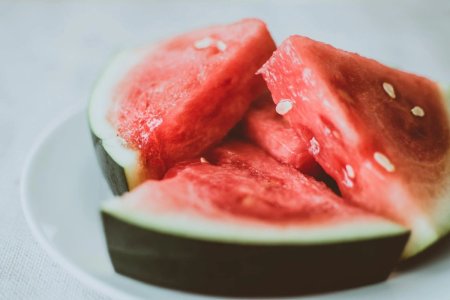What watermelon really does to your body—and why it deserves a spot on your summer plate
By
Veronica E.
- Replies 0
Disclaimer: The information provided in this article is for educational purposes only and is not intended as a substitute for professional medical advice, diagnosis, or treatment. Always consult your physician or other qualified healthcare providers with any questions you may have regarding a medical condition or before making any changes to your health regimen.
When it comes to summer staples, few things are as iconic—or as refreshing—as a slice of watermelon.
Whether you remember enjoying it at family cookouts or keeping a chilled bowl handy during a hot afternoon, watermelon is more than just a seasonal treat.
It’s hydrating, nutritious, and full of surprising benefits that go well beyond its sweet, juicy bite.
So, is watermelon actually good for you?
Let’s take a closer look at why this summertime favorite is worth keeping in your kitchen.

The hydration hero of summer
Watermelon lives up to its name—it’s more than 90% water, making it one of the most hydrating foods you can eat.
A few slices after a morning walk, a little gardening, or a game of pickleball can help replace fluids lost to sweat.
On top of that, watermelon delivers important electrolytes like potassium and magnesium, which help muscles function and support overall hydration.
In a season when staying cool and hydrated is a top priority, watermelon offers a delicious, natural way to do both!
Also read: This popular fruit may be the sweet secret to better heart health in postmenopausal women
Packed with more than just water
Don’t let the light texture fool you—watermelon is surprisingly rich in nutrients. Each bite offers a range of health-supporting compounds, including:
Watermelon also contains beneficial phytochemicals—plant compounds that support immunity and may protect your cells from damage over time.
Also read: This beloved fruit is in danger: could a global fungus outbreak wipe it out forever?
A smart choice if you’re watching your weight
Watermelon is low in calories—just under 50 per cup—and high in water, which means it can help you feel full without filling you out.
Many dietitians recommend it as a healthy snack, especially for those looking to manage their weight.
The balance of water and fiber makes it satisfying and refreshing, which can help curb cravings for heavier, more processed snacks.
If you’re looking for a naturally sweet bite that won’t throw off your health goals, watermelon fits the bill!
What about the sugar content?
Yes, watermelon is sweet, but most of that comes from natural sugars.
A typical slice has around 17 grams of sugar—less than many other fruits, including grapes, mangoes, cherries, and pears.
That said, portion size still matters.
While it’s tempting to eat half a melon in one go, pairing it with other foods like a few nuts or a slice of cheese helps round out the snack and keep blood sugar more stable.
Also read: Avoid these breakfast mistakes that can secretly spike your blood sugar levels!
Fun and easy ways to enjoy it
While eating watermelon by the slice is always a winner, here are some creative ways to work it into your meals and snacks:
These ideas are not only easy, but they make watermelon more versatile in your everyday meals.
Can you eat watermelon every day?
For most people, eating watermelon regularly is perfectly safe—and even encouraged.
It’s better to eat more fruit than less, and watermelon provides a variety of helpful nutrients.
That said, it’s still important to eat a well-rounded diet that includes vegetables, whole grains, and lean proteins.
As always, balance is key.
Watermelon can be part of a healthy diet, but it shouldn’t take the place of other essential foods.
Also read: Are you eating enough fruit to stay young? Dietitian reveals the surprising answer
A few things to keep in mind
While watermelon is generally safe, people with certain health conditions—like diabetes or kidney issues—should be mindful of how much they eat.
Because it contains natural sugars and potassium, it’s a good idea to check with a healthcare provider if you have any concerns.
From keeping you hydrated to supporting heart health and digestion, watermelon is much more than a seasonal treat. It’s low in calories, packed with beneficial nutrients, and easy to enjoy in a variety of ways.
If you’ve been looking for a way to add more fruit to your summer meals, this is a great place to start.
So go ahead—cut a slice, take a bite, and know you’re doing something good for your body!
Read next: The overlooked drink that can help you stay hydrated with diabetes, say dietitians

Do you have a favorite way to enjoy watermelon? Maybe a family recipe or summer memory you’d like to share? Let us know in the comments—we’d love to hear how you make the most of this sunny, sweet fruit!
When it comes to summer staples, few things are as iconic—or as refreshing—as a slice of watermelon.
Whether you remember enjoying it at family cookouts or keeping a chilled bowl handy during a hot afternoon, watermelon is more than just a seasonal treat.
It’s hydrating, nutritious, and full of surprising benefits that go well beyond its sweet, juicy bite.
So, is watermelon actually good for you?
Let’s take a closer look at why this summertime favorite is worth keeping in your kitchen.

Juicy, refreshing, and packed with nutrients—watermelon is a summertime favorite with surprising health benefits. Image Source: Pexels / Lisa from Pexels.
The hydration hero of summer
Watermelon lives up to its name—it’s more than 90% water, making it one of the most hydrating foods you can eat.
A few slices after a morning walk, a little gardening, or a game of pickleball can help replace fluids lost to sweat.
On top of that, watermelon delivers important electrolytes like potassium and magnesium, which help muscles function and support overall hydration.
In a season when staying cool and hydrated is a top priority, watermelon offers a delicious, natural way to do both!
Also read: This popular fruit may be the sweet secret to better heart health in postmenopausal women
Packed with more than just water
Don’t let the light texture fool you—watermelon is surprisingly rich in nutrients. Each bite offers a range of health-supporting compounds, including:
- Lycopene, an antioxidant that gives watermelon its red color and may support heart health and reduce the risk of certain cancers.
- Beta-carotene, which the body turns into vitamin A—essential for healthy vision, skin, and immune function.
- Vitamin C, to support immune health and help the body repair tissues.
- Vitamin A, especially helpful for eye and skin health.
- Potassium and magnesium, which help regulate blood pressure and keep muscles working properly.
- Fiber, in modest amounts, to help support digestion.
Watermelon also contains beneficial phytochemicals—plant compounds that support immunity and may protect your cells from damage over time.
Also read: This beloved fruit is in danger: could a global fungus outbreak wipe it out forever?
A smart choice if you’re watching your weight
Watermelon is low in calories—just under 50 per cup—and high in water, which means it can help you feel full without filling you out.
Many dietitians recommend it as a healthy snack, especially for those looking to manage their weight.
The balance of water and fiber makes it satisfying and refreshing, which can help curb cravings for heavier, more processed snacks.
If you’re looking for a naturally sweet bite that won’t throw off your health goals, watermelon fits the bill!
What about the sugar content?
Yes, watermelon is sweet, but most of that comes from natural sugars.
A typical slice has around 17 grams of sugar—less than many other fruits, including grapes, mangoes, cherries, and pears.
That said, portion size still matters.
While it’s tempting to eat half a melon in one go, pairing it with other foods like a few nuts or a slice of cheese helps round out the snack and keep blood sugar more stable.
Also read: Avoid these breakfast mistakes that can secretly spike your blood sugar levels!
Fun and easy ways to enjoy it
While eating watermelon by the slice is always a winner, here are some creative ways to work it into your meals and snacks:
- Infused water: Add watermelon cubes and mint to a pitcher of water for a flavorful, sugar-free refreshment.
- Salads: Combine watermelon with feta cheese, cucumber, and olive oil for a savory-sweet salad.
- Smoothies: Blend watermelon with lime juice and berries for a cool, thirst-quenching drink.
- Frozen treats: Puree watermelon and pour it into popsicle molds for a healthy, homemade frozen dessert.
These ideas are not only easy, but they make watermelon more versatile in your everyday meals.
Can you eat watermelon every day?
For most people, eating watermelon regularly is perfectly safe—and even encouraged.
It’s better to eat more fruit than less, and watermelon provides a variety of helpful nutrients.
That said, it’s still important to eat a well-rounded diet that includes vegetables, whole grains, and lean proteins.
As always, balance is key.
Watermelon can be part of a healthy diet, but it shouldn’t take the place of other essential foods.
Also read: Are you eating enough fruit to stay young? Dietitian reveals the surprising answer
A few things to keep in mind
While watermelon is generally safe, people with certain health conditions—like diabetes or kidney issues—should be mindful of how much they eat.
Because it contains natural sugars and potassium, it’s a good idea to check with a healthcare provider if you have any concerns.
From keeping you hydrated to supporting heart health and digestion, watermelon is much more than a seasonal treat. It’s low in calories, packed with beneficial nutrients, and easy to enjoy in a variety of ways.
If you’ve been looking for a way to add more fruit to your summer meals, this is a great place to start.
So go ahead—cut a slice, take a bite, and know you’re doing something good for your body!
Read next: The overlooked drink that can help you stay hydrated with diabetes, say dietitians
Key Takeaways
- Watermelon is highly hydrating, being made up of more than 90% water and loaded with electrolytes, making it an excellent snack for rehydration in summer.
- The fruit is rich in nutrients, including lycopene, beta-carotene, vitamin A, vitamin C, potassium, and magnesium, all of which contribute to good health and may lower the risk of cancer and heart disease.
- Watermelon is low in calories but high in fiber and water, helping you feel full and making it a handy food for those looking to manage or lose weight.
- While naturally sweet and lower in sugar than some other fruits, it’s best to pair watermelon with other foods for a balanced diet rather than relying on it as your only source of nutrients.
Do you have a favorite way to enjoy watermelon? Maybe a family recipe or summer memory you’d like to share? Let us know in the comments—we’d love to hear how you make the most of this sunny, sweet fruit!






